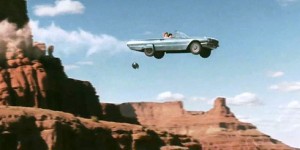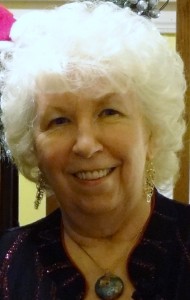Earlier today, I had a difference of opinion with one of my Facebook friends — Tony — about the movie, Thelma and Louise. In a move that amazed even me, I went into my archives and found a column I’d written on June 22, 1991, just days after the movie was released. I stand by the analysis that I wrote then. (The only change/addition I’ve made is the bracketed explanation about the film Independence Day.)
________________________________________________________________________________________________________________________________________
Several years ago, I saw a movie called Independence Day. (This 1983 movie, directed by Robert Mandel, starring Kathleen Quinlan and Dianne Wiest, is not to be confused with the 1996 science fiction film of the same name.) It was the story of a violent marriage and it had an explosive, dramatic ending. I remember the exhilaration and excitement I felt when, with great deliberation, careful planning, perhaps a silent cheer from abused women everywhere, the battered woman filled the house with gas and blew it up with her husband inside.
I saw the movie again recently. I watched in shock and horror as the ending approached and it dawned on me what was really going to happen. The wife did, in fact, blow up house and husband. What I had forgotten was that she was in the house too.
How could I have forgotten that? How could I have been so manipulated into seeing that explosion as a happy ending?
Those questions — and the answers — came to me with astounding clarity during one of the many discussions I’ve had recently on the subject of Thelma and Louise. One of my friends who had seen it and loved it said the unhappy ending was simply realism; it was the only thing that could have happened.
Unhappy ending? That’s it, I said to myself. Like the ending of Independence Day, the ending of Thelma and Louise was not presented as unhappy. It was presented as triumphant, victorious, jubilant. Like the battered wife of Independence Day, Thelma and Louise ended up dead but the audience cheered and the critics pronounced the film a fun-filled frolic, a feminist romp that “all women will love, all men must see.”
Thelma and Louise is the story of two women who have a history (and a present) of being mistreated by men — husbands, boyfriends and strangers. As the plot unfolds, they come to use standard male tactics as a way of dealing with the abuse: in the pivotal scene, Louise guns down a would-be rapist in the parking lot of a bar and from there, the two women — rightly assuming that no one would believe their version of the attempted rape — hit the road and head for Mexico.
Market surveys all show that to be commercially successful, a movie must appeal to males, age 16 to 25. This accounts for the fact that a high percentage of Hollywood films are laced with violence, sex, car chases, explosions, crude language and multi-million dollar special effects. Thelma and Louise passes up no opportunity to include these elements.
It’s a movie that competently reflects the culture it springs from — a culture that says “if you have a problem, shoot it,” a culture that insists that violence is not only effective, it’s entertaining. From the highly eroticized rape scene to the terrorist methods the women use in dealing with a highway patrolman to the spectacular explosion of an oil truck, violence is seen as a lark in which the occasional casualty is only to be expected, but nothing much to be concerned about.
And the effects of violence? After a brutal rape, you might think the last thing on Thelma’s mind would be sex with a stranger. But no, barely a day later, there she is, ready to be seduced by a hitchhiker the women pick up who turns out to be a charming armed robber. Is the lesson here that maybe being raped isn’t so bad after all?
Defenders of Thelma and Louise insist that this movie will cause people to talk about violence against women. I doubt that but, if it’s true, what will they say? I’m told that in some theatres, women stand and cheer at the violent methods employed by Thelma and Louise. Some of my own friends say they have felt empowered by the movie, have enjoyed seeing two women who decided to fight back.
I can’t concede their point. Thelma and Louise decided to fight back — and they lost. Far from being a tool of empowerment for abused women, Thelma and Louise exploits the issue of violence against women for its own commercial purposes. There is no affirmation of womanhood in the movie, no suggestion that things can change; in the end, there’s no hope.
The final scene is not violent. The death of Thelma and Louise is stylized, almost as in a cartoon. The final impression is of two women who have hugged each other, thrown back their gorgeous heads in gay abandon, decided they can’t turn back. They gun the motor of that ’66 sea-green T-bird, leave their police pursuers in a cloud of dust, and drive straight into the Grand Canyon. The action freezes as the car is in full flight and the manipulation is complete — a tragic ending that leaves its audience feeling good.
Maybe the ending should have come with a word of warning though: don’t try this trick at home, ladies. Freezing the frame only works in the movies.




I’m going to rent the movie and watch it again! I don’t remember what I thought about it……
I saw this movie when it first came out and was deeply disturbed. I have never re-watched it. Your review captures the essence of why I had such difficulties with it.
The fact that it continues to be celebrated as a feminist movie is extremely problematic. Thanks for sharing this post. I now have a go to item to refer to when I hear others praising it.